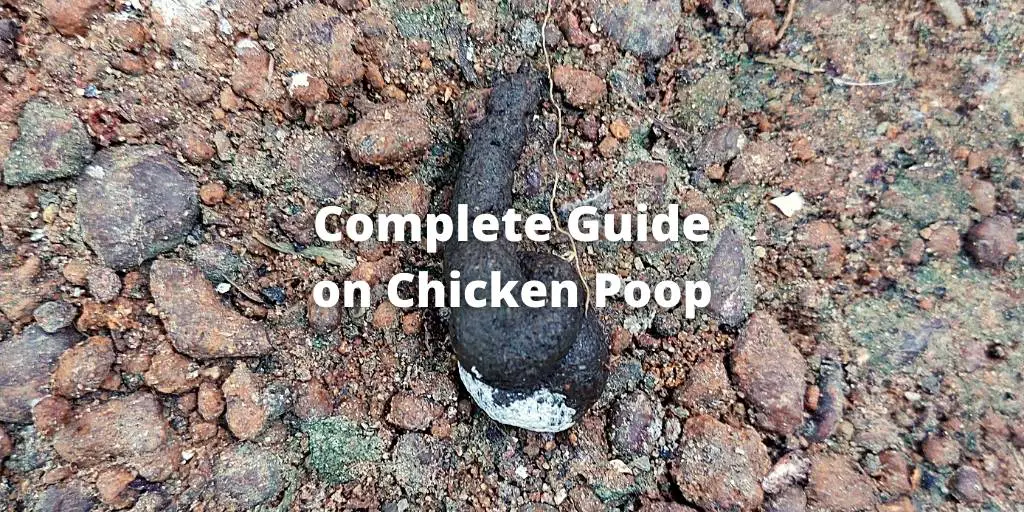Chicken poop tells the actual health of chickens. Knowing your chicken’s poop condition will help you care for your flocks.
The poultry raisers ignore their chicken’s poop. Yes, it’s dirty, but if you want to get into a successful chicken farming you need to look into it.
Like humans, chickens must have a good digestive system to digest their food. Different types of health issues and feed can change the chicken poo color.
So, by looking at their poop color and condition, you can tell how they digest their food and other health issues.
Regularly monitoring your chicken’s poop will keep you aware of their health. You may observe different feces colors, such as green, yellow, brown, black, milky, and more.
You must understand which chicken feces are normal, abnormal, and unhealthy.
No worries. In this definitive guide we will explain:
- Appearance of normal chicken poop
- Abnormal and unhealthy chicken conditions with a chart.
- Tips to keep your chicken poop normal and healthy.
- Various uses of chicken poop in backyard farming.
- And FAQs.
What Does Normal Chicken Poop Look Like?
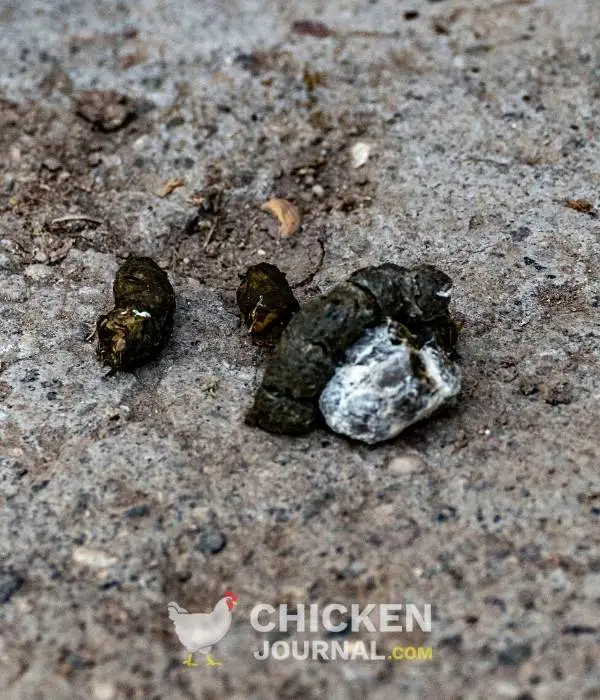
The normal chicken poops are seen in different colors and conditions. It is essential to understand what is normal and what is not.
You will notice normal chicken droppings of different colors, such as green, white, brown, and black. But most healthy chicken poop is brownish with white spots and greenish.
Watery chicken poop is not always a sign of diarrhea or another health issue. In areas with very hot climates, you may see runny chicken poop.
Below we will talk about what normal chicken droppings look like and how to treat them.
Healthy and Unhealthy Chicken Poop Chart
Below is the chart categorizing it into normal, abnormal, and unhealthy chicken poop conditions:
| Poop Color/Condition | Description | Possible Causes | Action Required |
|---|---|---|---|
| Normal | Solid brown with white spots (urates) | Natural, maybe Marek’s disease | No action needed |
| Green | No action is needed unless other symptoms | Green, result of a green diet (grass, vegetables) | Monitor for other symptoms, consult a vet if needed |
| Yellow | Yellow, from foods like strawberries, corn | Normal if chicken appears healthy, but may indicate issues if chicken looks unhealthy | Monitor, consult a vet if consistently black |
| Black | Black, from foods like blackberries, charcoal | Normal if chicken appears healthy, investigate if consistently black | Monitor, consult vet if consistently black |
| Blue/Teal | Blue or teal, from dark purple foods | Normal | No action needed |
| Runny Brown | Runny brown, possibly from high water content | Normal, if occasional, may indicate E.coli or diarrhea if frequent | Monitor, consult a vet if frequent |
| Abnormal/Unhealthy | |||
| Orange/Red | Red or orange lining may indicate bleeding | Monitor, and consider probiotics | Monitor, consider probiotics |
| White | Liquid white, excessive water intake | This may indicate Gumboro disease if persistent | Monitor, and consult a vet if persistent |
| Foamy Milky | Yellowish, foamy, poor digestive system | This may indicate an upset digestive system or parasites | Monitor, and consult a vet if persistent |
| With Worms | Worms visible in poop, helminthiasis | Infestation by worms, consult a vet for deworming | Consult a vet for deworming |
| Watery | Clear watery, possibly from heat or stress | This may indicate stress or infectious bronchitis if persistent | Monitor, consult a vet if persistent |
Regular Chicken Poop
The regular chicken poop is easy to recognize. It is mostly solid and brown in color. You may see some white spots (urates) above the brown poo.
If your chickens receive balanced feed supplements for their age, they should release regular poop.
You can also read: Complete guide on feeding chickens
Now talk about why and how the chicken poop color changes and what the normal colors are?
Green Poop
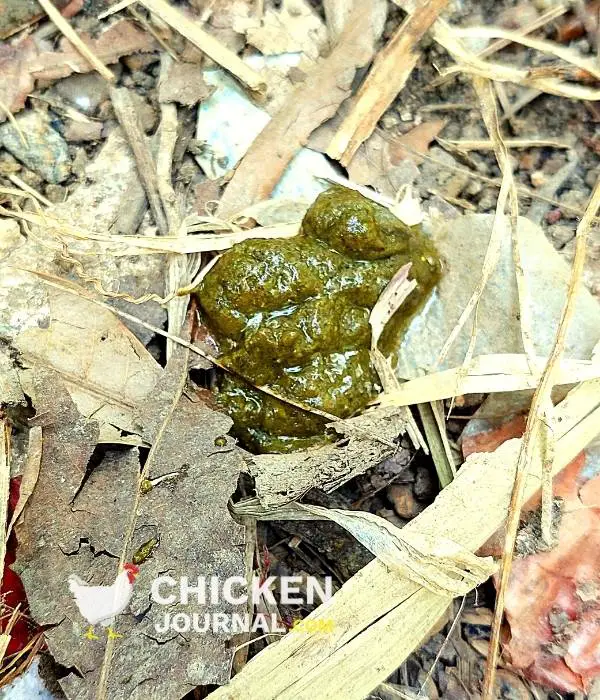
Green poop is not something to worry about. Chicken’s green poop is the result of an excessively green diet, such as grass, leaves, and green vegetables.
It is natural and does not pose a health risk to the chicken. Most free-ranging chickens have this type of green poop.
In some cases, it may be due to Marek’s disease.
Yellow Poop
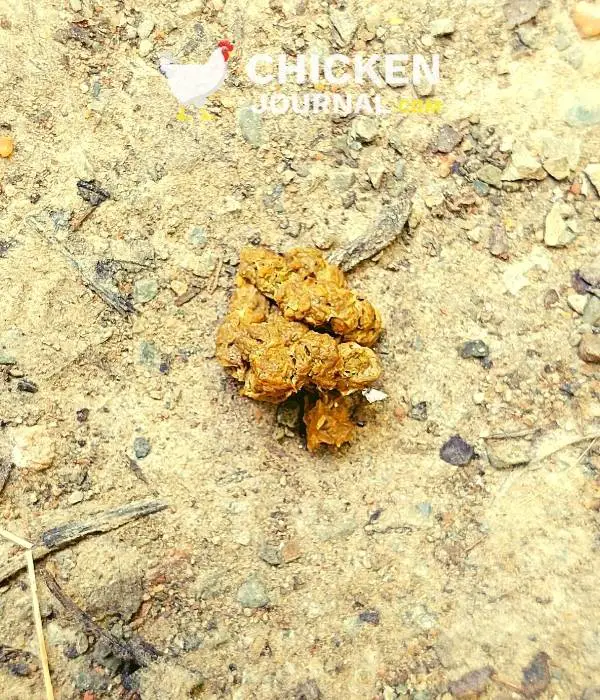
Most of the time, yellow poop is the result of eating a lot of strawberries, corn, forsythia blooms, and squashes.
If your chicken is looking healthy with yellowish poop, then there’s nothing to worry about.
In a few cases, chicken looks unhealthy and lethargic with yellow poop. In those cases, don’t be confused, contact your vet.
Because sometimes yellowish poop can mean that a chicken has coccidiosis, lead poisoning, internal parasites, kidney issues, typhoid, or other serious problems.
Black Poop
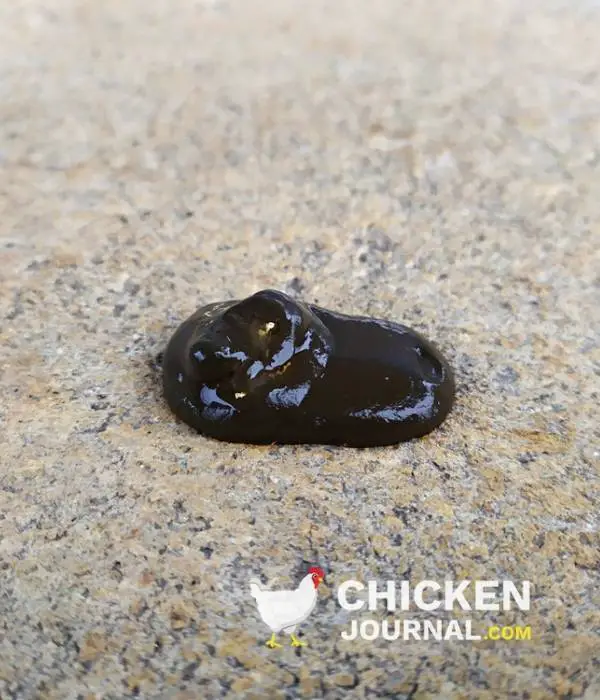
If your chicken consumes things like blackberries, charcoal, and dark purple treats, their poop will be black.
Don’t worry if they are looking healthy. But if the chicken consistently produces black feces without the above treats, you may need to investigate further.
Black stool may be a sign of internal bleeding in some cases. This type of issue, if left untreated, can be fatal. If the concern doesn’t go away, call your vet.
Blue/Teal Poop
We’ve already said that the color of chicken poop changes depending on what the flock eats.
Likewise, blue poo can also be caused by food like red cabbage or other dark purple vegetables. There is nothing to be concerned about if the stool is blue or teal color.
Runny Brown Poop
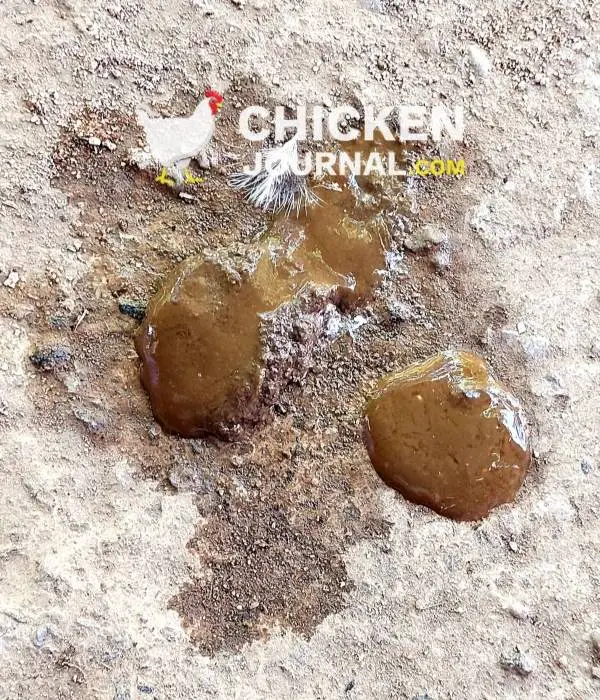
Mostly the runny brown chicken poop is normal. This may be a cause of eating high wet food which increases the water content in the chicken’s intestine.
It may be brown poo that is sticky and liquid. Your chicken may release this type of poop up to nine times a day.
But more than that is possibly a cause of E.coli or diarrhea. You need to check this out with your vet.
Abnormal and Unhealthy Chicken Poop
There are a few colors of chicken poop that you need to worry about. Let’s understand what are the possible causes.
Orange or Red Poop (Blood in Chicken’s Poop)
Sometimes you can see a red and orange lining with chicken droppings.
It’s usually normal, but it could be a sign of internal bleeding. This may be the cause of acute to chronic intestinal lining bleeding.
If the intestinal lining is bleeding occasionally, it’s not a big deal, but if it’s always bleeding, you have to give them a probiotic.
Giving probiotics will solve this problem within a few days. If not, you need to discuss it with your vet.
White Poop
In normal poop, you see a white layer on the top. The reason behind that layer is urates.
But liquid white color poop without any hard matter is caused because of excess water intake. If your chicken is pooping white poop repeatedly, it may be a risk of Gumbro disease.
So keep an eye on the poop color and contact your veterinarian if the problem is not solved.
Foamy Milky Chicken Poop
The yellowish, foamy poop seen in chickens with diarrhea is due to the chicken’s poor digestive system. It is mainly caused because of eating high amounts of protein.
Some chicken owners see this difficulty when giving too much protein treats like mealworms. This is a symptom of an upset digestive system.
Internal parasites may cause yellowish poop that looks like foam. So, you need to look into this.
If the issue isn’t resolved, don’t hesitate to contact your nearest veterinarian.
Chicken Poop With Worms
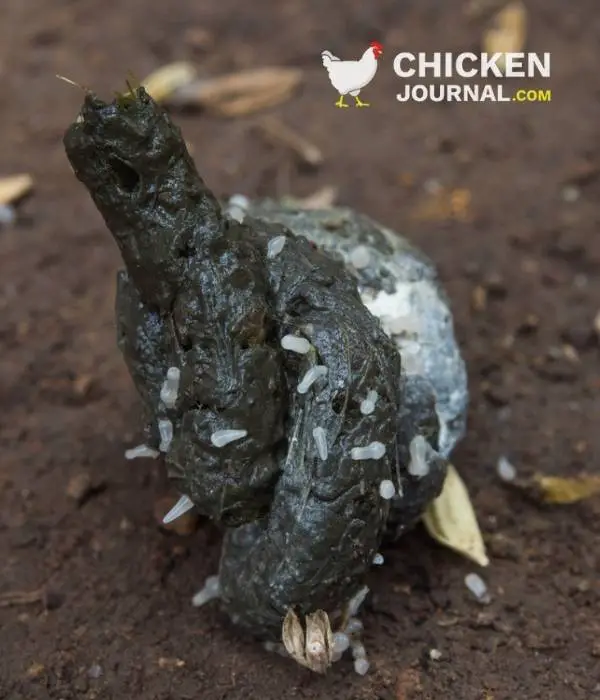
Helminthiasis, or worm infestation, is the major cause of worms in chicken poop. If you see worms in the poop, it’s time to use a chicken wormer medicine.
You can read our complete guide on chicken deworming.
Chickens mainly eat stuff from the soil and grass. This is the major cause they are infested with worms.
These internal worms suck all the vitamins and minerals from the chicken’s intestine, which leads to unhealthy poop and lack of nutrition.
Watery Poop
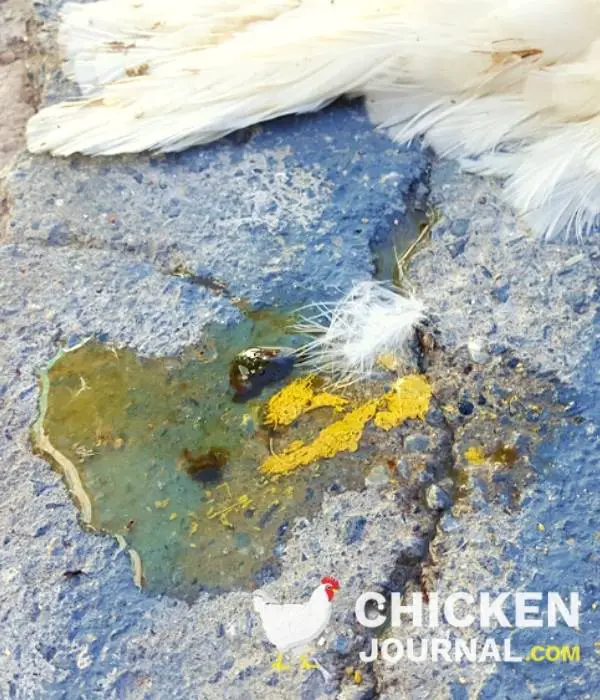
Watery chicken poop is not always a concern. Mainly chicken poop is caused by having too much heat.
In warm and hot climate areas, chickens are prone to mild diarrhea. The fast bowel movement causes a lack of absorption, resulting in watery poop.
Sometimes, watery poop is a big sign that a chicken is stressed. It usually happens when chickens are moved to a new place.
You should consult your veterinarian if the issue is not resolved within 1-2 days. In some cases, watery poop is a sign of infectious bronchitis.
Tips to Keep Your Chicken’s Poop Normal and Healthy
For the healthy growth of chickens, proper digestion is most important. You can see a chicken poop and tell whether the chicken’s gut health is good.
Below we have added a few tips to keep your chicken’s poop normal and healthy.
1. Keep Monitoring Your Chicken’s Poop
Raising chickens not only means looking after their feed, water, and coop but also their health. You need to check your chicken’s poop regularly.
Occasionally, chicken poop can indicate their health condition. So, keep an eye on their droppings, and if you see any color variation and abnormal poop condition, talk with your vet.
2. Add Probiotics to Your Chicken’s Feed
The common cause of unhealthy chicken poops is lack of good bacteria in the intestine. After using antibiotics, the intestinal bacteria decrease.
This causes chicken droppings to be unhealthy and abnormal. Not only this, it causes a lack of nutrition and growth retardation.
In this type of case, treating them with good probiotics helps them to recover their intestinal good bacteria. It keeps their gut healthy.
3. Give Clean and Adequate Drinking Water
Another reason for abnormal droppings is a lack of drinking water. Chicken eats lots of dry feed and needs a continuous water supply.
Inadequate drinking water causes indigestion and diarrhea in chickens. In some cases, you may see diarrhea.
So, providing adequate water is most important. If you want hassle-free watering, add a few of the best automatic chicken waterers inside the poultry coop.
Chicken waterers are available in different types and quantities, so buy a good one that will suit your flocks. Flocks’ age and size are most significant when buying a poultry drinker.
Always provide them with clean water because dirty water could contain various types of infectious viruses and bacteria.
4. Provide Them Open Space for Free-Range
Always try to provide an open space to free-range your chickens. Free-ranging chickens are always healthy as compared to chickens raised inside portable coops.
A free-range chicken gets different nutrients from grass, herbs, and soil. They eat grits from the soil, which helps them to grind their food inside the gizzard.
While the birds growing inside chicken tractors only get the balanced company-made feed. The feed does not contain any green herbs.
That’s why organic free-range chicken eggs and meat are tastier than caged chickens. Foraging chicken always has a good gut because of complete nutrition.
5. Keep the Coop Clean
Keeping the chicken coop clean is the most essential part of poultry farming. Cleaning the chicken coop keeps your chickens clean, beautiful and healthy.
Chickens that live in a clean environment are less likely to be infected with infectious diseases or parasites. You should replace the coop litter every alternate month.
To avoid infectious disease, clean the coop every 1-2 months. A worm infestation is a common health problem in birds caused by unhygienic conditions in coops and run areas.
6. Do Deworming if Needed
If you see worms in your chicken’s poop, then your chicken is likely infested with worms. Chicken can be infested internally or externally by worms.
Worm infestation causes catarrh, diarrhea, intestinal obstruction, loss of appetite, anemia, weakness, paralysis, and poor feathering in chickens.
If you see worms in chicken droppings, treat them with deworming medicines. You should ask your nearest vet for a complete deworming solution if it does not work.
7. Contact Your Vet for Emergency Situations
In emergency situations, such as diarrhea and other digestive issues in chickens, you must contact a veterinarian. Veterinarians are professional and will resolve your issue quickly.
Not only that, you can also consult them about proper feeding techniques. Always remember that you should not rely on an online guide in an emergency. Don’t worry, consult a veterinarian if your chickens are in an emergency.
FAQs
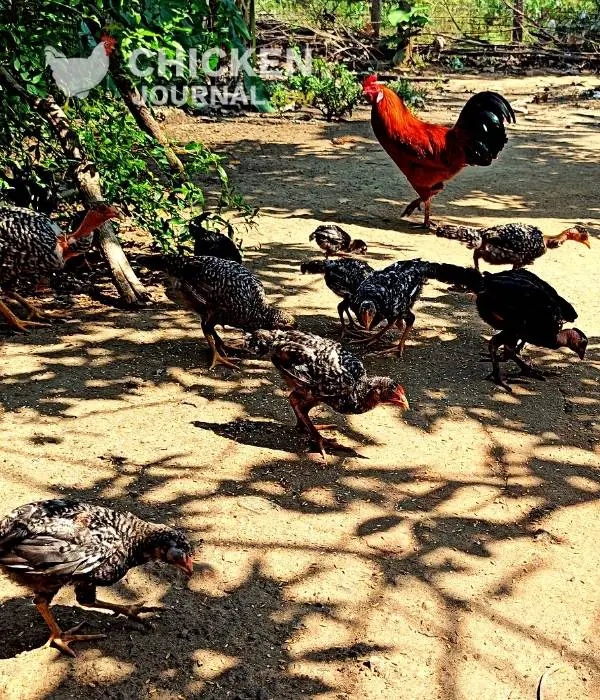
Here are some common FAQs that most of the chicken raisers ask about chicken poop:
How Often Do Chickens Poop?
Chickens eat a lot and continuously. They spend much time foraging and very little time resting below trees or taking dust baths. Usually, a chicken expels poop every 30-40 minutes.
A free-range chicken spends about 7-8 hours daily foraging, meaning a healthy chicken poops about 15-16 times daily.
Is Chicken Poop Toxic to Humans?
Chicken poop is not toxic to humans but carries infections that lead to disease. Poops of poultry birds, like chickens and ducks, carry pathogens like E.Coli, Salmonella, and Campylobacter.
Therefore, it is better to take precautions if you enter a chicken coop or the backyard where your chickens live. Ensure you use a high-quality mask, gloves, and shoes when working.
Does Chicken Poop Attract Rats?
Most of the rats live in the area where they get their food. A chicken coop with droppings and poultry feed will attract rodents like rats. Sometimes, rats kill baby chicks and eat them.
Ensure you have robust fencing around your chicken coop with small mesh wire to avoid rodents. This will prevent rodent attacks and external infections from affecting baby chicks.
Can Chicken Poop Make Dogs Sick?
Yes, chicken poop can make dogs sick. Chicken feces may carry Salmonella, which can potentially infect your dog’s body.
Most dogs eat chicken poop if they’re living nearby coop or run. The owner’s responsible for cleaning those areas regularly or preventing their pet from entering the area.
Why Do Chicken Poop So Much?
A chicken poops every 30 minutes on average. That’s a lot. The reason behind this is they eat a lot. They don’t digest everything they feed, so they have a faster bowel movement.
Is Chicken Poop Good for Compost or Fertilizer?
Chicken poop can be used to compost or fertilize land with low nitrogen levels. Chicken droppings have the highest amount of nitrogen, phosphorus, and potassium.
It is best to leave the chicken coop litter open for a few months before using it. The main problem with chicken poop is its powerful and unpleasant smell.
Summary
In this guide, we have explained everything you need to know about chicken poop. Now, you will know what is expected and what is abnormal or unhealthy.
It is essential to understand the color and condition of the chicken poop, as it can tell you about the chicken’s health. You will have to monitor their poosp every few days.
If you know why the chicken’s poop looks odd, you can treat them in time. Not only this, if you take proper precautions, you can keep their gut healthy.
The condition of chicken poop fluctuates constantly, which is why antibiotics and probiotics are not always allowed. You can use probiotics initially to solve the problem.
I hope this guide helped you to understand your chicken poop.
